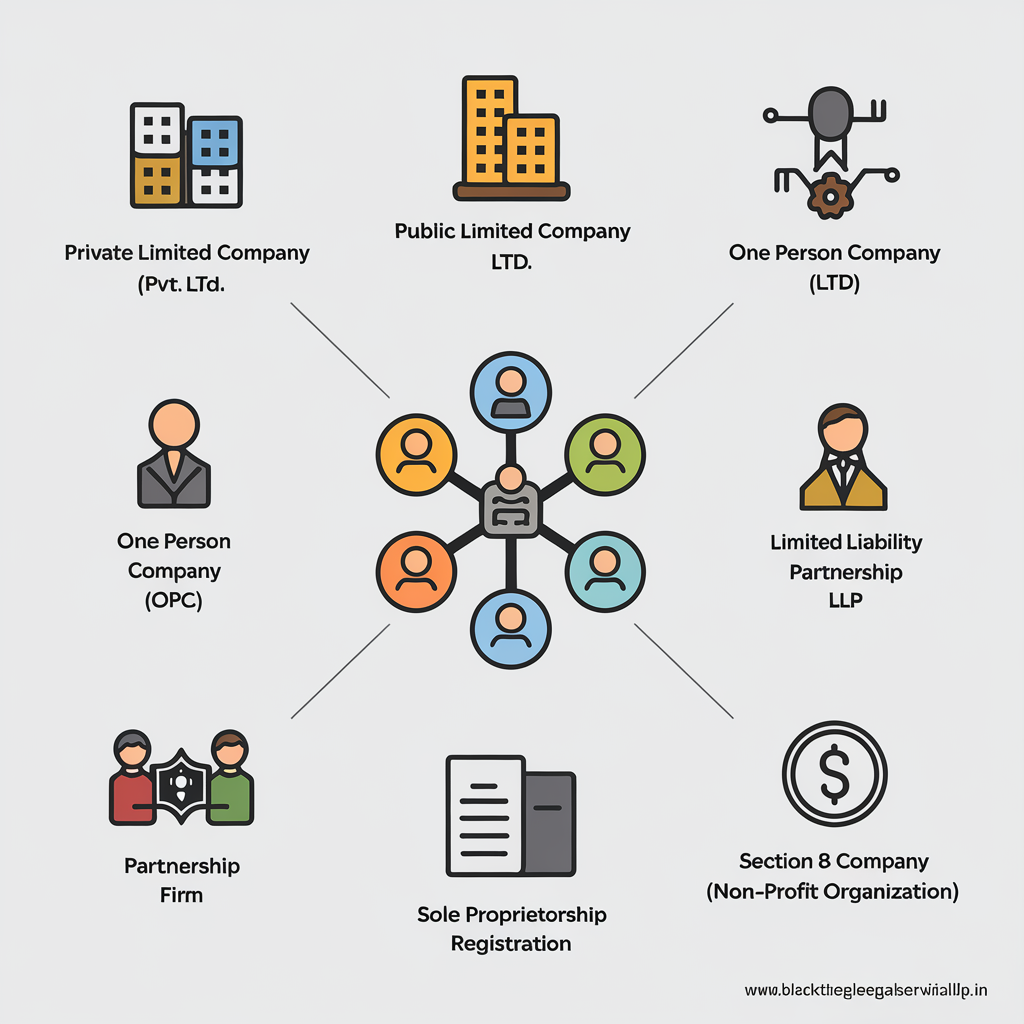Registration For Company This blog explains the progress of seven types of company registration in India: Private Limited Companies, Public Limited Companies, One Person Companies, Limited Liability Partnerships, Partnership Firms, Sole Proprietorships and Section 8 Companies. Check out this blog for detailed information about the different types of company registration available in India.
- There are 7 Types of Registration For Company.
- Private Limited Company (Pvt. Ltd.) Registration For Company?
- Public Limited Company (Ltd.) Registration For Company in India?
- One Person Company (OPC) Registration For Company in India?
- Limited Liability Partnership (LLP) Registration For Company in India?
- Partnership Firm Registration For Company in India?
- Sole Proprietorship Registration For Company in India?
- Section 8 Company (Non-Profit Organization)
- Conclusion
- FAQs
- 1. What is the full form of Ltd?
- 2. Do startups have to pay GST?
- 3. Which is a registered company?
- 4. Which registration is best for the startup?
- 5. Which Type of Company is Best to Register?
- 6. What are the 4 main types of companies?
- 7. How to verify a company?
- 8. What is the minimum amount to start a company?
- 9. Which business is more in demand?
- 10. Do I need a company secretary?
There are 7 Types of Registration For Company.
Type 1: Private Limited Company (Pvt. Ltd.)
Type 2: Public Limited Company (Ltd.)
Type 3: One Person Company (OPC)
Type 4: Limited Liability Partnership (LLP)
Type 5: Partnership Firm
Type 6: Sole Proprietorship Registration
Type 7: Section 8 Company (Non-Profit Organization)

Private Limited Company (Pvt. Ltd.) Registration For Company?
Registering a private limited company (Pvt Ltd) in India is one of the simplest business structures, as it provides limited liability to its shareholders and is a separate legal entity from its owners. Here is a step-by-step guide on how to register a private limited company in India.
- Ownership: Private shareholders (usually 2 to 200).
- Features: Limited liability, separate legal entity, and ease of raising capital.
- Best For: Startups, small and medium-sized businesses looking to grow.
Minimum Requirements
- A minimum of 7 shareholders is required.
- Minimum 3 directors, at least one of whom is a resident of India.
- ROC-approved name for the company.
- DIN (Director Identification Number) for all directors.
- Registered office address for the company in India.
- DSC (Digital Signature Certificate) for all promoters.
Read the Full Article About Private Limited Company (Pvt Ltd) Click here
Public Limited Company (Ltd.) Registration For Company in India?
A public limited company (Ltd) in India is a company that offers its shares to the public and can be listed on a stock exchange. Registration Progress The Companies Act, 2013 is governed by the statute and is monitored by the Ministry of Corporate Affairs (MCA). Below is a step-by-step guide for registering a public limited company in India.
- Ownership: Public shareholders.
- Features: Shares traded on stock exchanges, higher compliance requirements, limited liability.
- Best For: Large businesses with plans to raise funds from the public.
Minimum Requirements
- Minimum 7 shareholders.
- Minimum 3 directors, at least one of whom is a resident Indian.
- Company name approved by the Registrar of Companies (ROC).
- Director Identification Number (DIN) for all directors.
- Digital Signature Certificate (DSC) for all promoters.
- Registered office address of the company.
Read the Full Article About Public Limited Company (Ltd)…Click here
One Person Company (OPC) Registration For Company in India?
An OPC is a type of company that allows a single person to operate as a separate legal entity. It combines the benefits of a sole proprietorship with the conditions of an individual limited company, providing its owner with narrower liability protection.
- Ownership: Single owner.
- Features: Limited liability, separate legal entity, but with just one shareholder.
- Best For: Individual entrepreneurs who want to limit their liability.
Minimum Requirements
1. One shareholder who is a citizen of India
2. At least one director who is a resident of India
3. A name for the company approved by the Registrar of Companies (ROC)
4. A registered office for the company
5. Director Identification Number (DIN) and Digital Signature Certificate (DSC) for all directors
6. One nominee to succeed the shareholder in case of permanent departure
Read the Full Article About One Person Company (OPC)…Click here
Limited Liability Partnership (LLP) Registration For Company in India?
Registering a Limited Liability Partnership (LLP) in India is a great choice for businesses that want to combine the benefits of a partnership with the liability of a fixed liability. Here is a detailed guide on the LLP registry process in India.
- Ownership: Partners in the business.
- Features: Limited liability, operational flexibility, and less stringent regulations than private/public limited companies.
- Best For: Professional services firms, consultants, or small businesses.
Minimum Requirements
1. Minimum 2 partners
2. Minimum 2 designated partners, at least one must be a resident Indian
3. Name approved by ROC for LLP
4. A registered office
5. DPIN of all designated partners
6. DSC of all partners
Read the Full Article About Limited Liability Partnership (LLP)…Click here
Partnership Firm Registration For Company in India?
A partnership firm is a business formation where two or more individuals come together to run an operation for profit. Each partner shares a share of money, shares responsibilities, and has a say in management discretion.
- Ownership: Multiple partners (minimum two).
- Features: Unlimited liability for partners, governed by the Partnership Act, of 1932.
- Best For: Small businesses with low investment and low compliance needs.
Minimum Requirements
1. Minimum 2 partners
2. A valid and available name for the firm
3. A registered office
4. A sealed and notarized partnership deed signed by all the partners
Read the Full Article About Partnership Firm…Click here
Sole Proprietorship Registration For Company in India?
The sole proprietorship is one of the easiest and most common forms of ownership, especially for small businesses and freelancers. Here’s an overview of its main features, advantages, and disadvantages.
- Ownership: Single individual.
- Features: No separate legal entity, unlimited liability, minimal compliance.
- Best For: Small businesses and freelancers.
Read the Full Article About Sole Proprietorship…Click here
Section 8 Company (Non-Profit Organization)
A Section 8 company is a type of non-profit organisation in India that is based on promoting charitable purposes such as education, arts, commerce, science, sports, social welfare, etc. It is governed by the Companies Act, 2013, specifically under Section 8, which outlines its registration and operational guidelines.
- Ownership: Individuals or groups of people working for a charitable or non-profit purpose.
- Features: No distribution of profits, high compliance, and tax benefits.
- Best For: NGOs, social enterprises, and charitable trusts.
Read the Full Article About Section 8 Company…Click here
Conclusion
The right kind of registration for the company is essential for the success and expansion of your business in India. Each registration type – be it a Private Limited Company, Public Limited Company, One Person Company, Limited Liability Partnership, Partnership Firm, Sole Proprietorship or Section 8 Company – offers different benefits, limitations and permission requirements.
Understanding these differences will help you align your business goals with the appropriate legal structure, ensuring limited liability, tax benefits and enhanced credibility. Moreover, the registration process, while meticulous, is a necessary step in structuring your business and protecting your interests. By carefully considering your options and following the steps required for registration, you can lay a strong foundation for your business to thrive in India’s competitive market landscape.
FAQs
1. What is the full form of Ltd?
Ltd. stands for Ltd., which refers to a company where the liability of shareholders is limited to the amount unpaid on their shares, thereby protecting their assets from the company’s debts.
2. Do startups have to pay GST?
Startups are exempted from GST if their annual turnover is less than the threshold of Rs 40 lakh for goods and Rs 20 lakh for services, or if they supply exempted goods or services.
3. Which is a registered company?
A registered company is considered a separate legal entity distinct from its owners/shareholders. This separate legal status enables the company to enter into contracts, own property, sue and be sued in its name.
4. Which registration is best for the startup?
The most preferred business structures for startups are private limited companies and LLPs. Private limited companies are legally recognised and often preferred by investors, but they involve strict compliance and high incorporation costs.
5. Which Type of Company is Best to Register?
If you want to raise funds in the future or plan for an ESOP, consider a private limited company. On the other hand, if you are into professional services and need limited liability, an LLP may be the best option for you.
6. What are the 4 main types of companies?
There are four main types of businesses: sole proprietorships, partnerships, limited liability companies (LLCs), and corporations. Before starting their venture, entrepreneurs should carefully determine which type of business structure best suits their needs.
7. How to verify a company?
Legal and financial documents: Look for public records or shared documents to verify their validity.
Licensing: Verify required licenses or registrations.
Certificate of incorporation: Validates the legal status of the company.
Employee credentials: Real companies have employees with real credentials.
8. What is the minimum amount to start a company?
Starting a private limited company costs a minimum of Rs 8000, not including professional fees. However, in some states it will be higher; in Kerala, Punjab and Madhya Pradesh, in particular, the fees are much higher. You will also need some paid-up capital, which can be as low as Rs 1000.
9. Which business is more in demand?
According to IBISWorld, the most in-demand occupations in 2023 include the oil and gas, travel and hospitality, wedding planning, and CBD manufacturing industries.
10. Do I need a company secretary?
As per section 270 of the Act, a private company is not required to have a secretary. In the absence of a secretary, the company itself, the directors or any authorised person shall perform the relevant duties on behalf of the directors.


Add a Comment